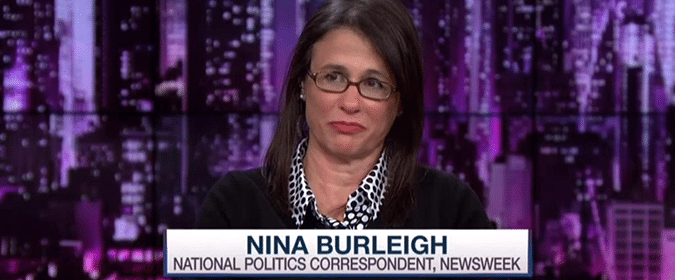
Nina Burleigh on MSNBC’s The Last Word with Lawrence O’Donnell
In the past year, journalism has changed more and faster than in all its previous years combined. Between outlets having to change how they do business because of economic difficulties to the distrust of the media that grew during the 2016 presidential election to the attacks on the media by President Donald Trump, the news industry has had to fight constantly — for money, for respect, for access.
Nina Burleigh of Newsweek has been through such changes before. She got her start in the 1990s and covered politics from the beginning, starting fresh out of college with a job covering the Illinois State House. Since then, she’s written for outlets like TIME, Rolling Stone, BusinessWeek, and People Magazine, just to name a few. She covered the Clinton White House and the Whitewater scandal, has traveled extensively through the Middle East as a journalist covering the Arab Spring, and has written five nonfiction books, with a sixth in the works.
We sat down with Burleigh to discuss how her career has changed over the years and what she sees as the state of journalism in 2017.
The following is condensed from a longer interview.
As a journalist, it seems as though you’ve written for everyone and done just about everything. But how did you first get started?
When I graduated college, I didn’t really know what I was going to do, and a professor told me about this program at the University of Illinois – Springfield where you could get an internship covering the State House in the State House press room with one of the media outlets. I got an internship with the AP and started covering the state legislature and really learned everything I needed to know about how bureaucracies work, how courts work. That education was crucial, and it’s applicable everywhere.
Is there a difference in how you worked covering more local issues from how you work now on the national level?
It’s much more complex at the federal level because there’s so much more going on and they’re overseeing a much bigger geographical area. But the same concepts of reporting apply. Work your beat, get your sources, meet them face-to-face if you can, which even in this day and age I find incredibly useful.
Has covering Trump, with all of his attacks on the press, changed how you work at all?
I don’t know that he’s changed the way I write. I think that his rise and now this presidency has challenged my energy levels because there’s a daily spew of mayhem, of newsworthy stuff. Before he came along you’d sit down and write stories about things like this maybe once a week, and now you have these things happening six or eight times a day. I think journalism, especially general-interest journalism, really provokes that and feeds on it.
It’s true that we’re more openly antagonistic to the administration because the lying is just such a big challenge to what we do for a living. They don’t care about the facts and so when they lie you have to say that this is a lie.
I do think that Trump is getting a raw deal because of the way that people respond to him. I do think that there might be things he’s working on that could be covered in a different way. So I hope that when reporters are calling him out that they’re covering him fairly. I hope that I cover him fairly and that I make the right calls on whether something is accurate or not.
You mentioned earlier that you sometimes get attacked on Twitter for calling out the president’s lies. Do you think that pointing out those lies is hurting the trust people have in the media?
I’m sure that presidents have lied and told stories ever since this country was founded. But now we’re living in a time where we see it more amplified because of the internet.
There are a lot of people who really don’t know who to trust. Is there anything you think the media can be doing to show those people that the media can be trusted?
I honestly don’t know the answer to that. [If you] continue to do your job with integrity, I assume that the thinking, right-minded, rational people will come around. I think the majority of the people do have the sense that the journalists aren’t at fault here. But on the other hand, there is certainly a lot of alienation in the country from power centers, and we in New York and Washington are perceived to be disconnected from what’s going on in the center of the country.
Short of every journalist who lives in Washington or New York decamping to Akron or Cincinnati or Huntsville or something and living there for a year, I don’t know what you can do. But I understand that alienation. I’m from Illinois, I grew up in the Midwest, so I completely understand feeling that disconnect from what’s going on in New York.
I’m always trying to find common ground — and I think you can always find common ground with people if you talk to them. But do I worry that I’m disconnected with them? No, because I actually feel like I carry that around with me all the time.

Jennifer Peters is former content manager of the News Media Alliance.

